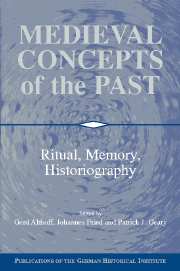Book contents
- Frontmatter
- Introduction
- 1 Authority and Legitimation of Royal Policy and Action: The Case of Henry II
- 2 King Henry II of Germany: Royal Self-Representation and Historical Memory
- 3 The Variability of Rituals in the Middle Ages
- 4 Rebels and Rituals: From Demonstrations of Enmity to Criminal Justice
- 5 Oblivion Between Orality and Textuality in the Tenth Century
- 6 Text and Ritual in Ninth-Century Political Culture: Rome, 864
- 7 The Concept of Time in the Historiography of the Eleventh and Twelfth Centuries
- 8 Constructing the Past by Means of the Present: Historiographical Foundations of Medieval Institutions, Dynasties, Peoples, and Communities
- 9 Topographies of Memory: Center and Periphery in High Medieval France
- 10 Challenging the Culture of Memoria: Dead Men, Oblivion, and the “Faithless Widow” in the Middle Ages
- 11 Artistic and Literary Representations of Family Consciousness
- 12 The Strange Pilgrimage of Odo of Deuil
- 13 The Rhineland Massacres of Jews in the First Crusade: Memories Medieval and Modern
- 14 The Martyr, the Tomb, and the Matron: Constructing the (Masculine) “Past” as a Female Power Base
- Index
8 - Constructing the Past by Means of the Present: Historiographical Foundations of Medieval Institutions, Dynasties, Peoples, and Communities
Published online by Cambridge University Press: 05 January 2013
- Frontmatter
- Introduction
- 1 Authority and Legitimation of Royal Policy and Action: The Case of Henry II
- 2 King Henry II of Germany: Royal Self-Representation and Historical Memory
- 3 The Variability of Rituals in the Middle Ages
- 4 Rebels and Rituals: From Demonstrations of Enmity to Criminal Justice
- 5 Oblivion Between Orality and Textuality in the Tenth Century
- 6 Text and Ritual in Ninth-Century Political Culture: Rome, 864
- 7 The Concept of Time in the Historiography of the Eleventh and Twelfth Centuries
- 8 Constructing the Past by Means of the Present: Historiographical Foundations of Medieval Institutions, Dynasties, Peoples, and Communities
- 9 Topographies of Memory: Center and Periphery in High Medieval France
- 10 Challenging the Culture of Memoria: Dead Men, Oblivion, and the “Faithless Widow” in the Middle Ages
- 11 Artistic and Literary Representations of Family Consciousness
- 12 The Strange Pilgrimage of Odo of Deuil
- 13 The Rhineland Massacres of Jews in the First Crusade: Memories Medieval and Modern
- 14 The Martyr, the Tomb, and the Matron: Constructing the (Masculine) “Past” as a Female Power Base
- Index
Summary
Most educated people share the belief that history teaches us lessons - that the historical past leads to the present and somehow extends into the future. The persistence of this belief is such that historians, as a professional group, benefit from sustained employment and positions of rank in many high cultures. The historian’s desire to elucidate the present, or even to unearth behavioral models for the future, results in a constant evolution of the questions that historians pose on the past. In our century, the historian’s desire for contemporary relevance has played a role in the growth of social history. More recently, it has contributed to the popularity of research projects on the environment and on gender roles. In using the past to explain the present, however, academic historians rarely achieve consensus in their conclusions, and they generally prognosticate future developments with no greater degree of success than the average person.
Of course, no one would contest that our present relates in a real sense to our past. However, the historian who researches the history of historiography or the development of an historical consciousness in a past society is soon forced to recognize a countervailing fact. In any period contemporary needs and yearnings determine why and how we explore the historical record. In reconstructing the past from the present we discover that the boundaries separating historical research from pure construction are not easily defined.
- Type
- Chapter
- Information
- Medieval Concepts of the PastRitual, Memory, Historiography, pp. 167 - 192Publisher: Cambridge University PressPrint publication year: 2002
- 4
- Cited by

